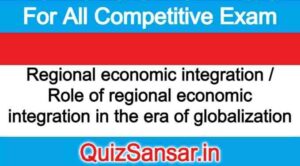
Regional economic integration / Role of regional economic integration in the era of globalization
Regional Economic Integration is the result of economic integration of various trading areas of different countries and it is also known as Regional economic grouping. It is a process in which neighboring states enter into an agreement in order to upgrade cooperation through common institutions and rules. It has enabled countries to facts on issues that are relevant to their stage of development as well as encourage trade between the neighbours.
Role of Regional Economic Integration
Regional economic integration plays a significant role in the era of globalization:
1. Competition: The formation of a trading block leads to intense competition among the firms of the entire block. Because of this intense competition, the efficiency of the firms improves resulting in reduction in prices and improvement in quality.
2. Trade Creation: Economists argue that economic integration results in trade creation because a trading block may remove tariff on member nations. Hence, a high cost producing country of the block can import goods from low cost producing member nation. Because of the formation of a free trade area, there is proper allocation of resources, and the nations can take advantage of the comparative cost due to which trade creation takes place.
3. Economic Growth: The formation of a trading block can increase economic growth of the region, due to which firms in the region would be in a position to produce goods at a lower price. This would increase demand, leading to large scale production and ultimately economic growth in the region.
4. Technological Development: Because of economic integration, there can be improvements in technology. As the firms grow, they would go for higher technological developments where a part of the increased profits can be used for research and development for the purpose of improving technology which will help to reduce prices, and improve quality.
5. Investment: There can be higher investment. The member nations may reduce or remove restrictions on investment and thus, there can be an increase in intra-regional investments, which would increase the economic development of the region.
6. Employment: Due to large scale production and distribution of goods, the employment also increases. There can be direct and indirect effect on employment. The direct effect is seen in the industries producing goods and services whereas the indirect effect is because of the increase in employment in the supporting industries such as ancillary units, banking, insurance, etc.
7. Consumer Welfare: A trading block facilitates consumer welfare in the region. Because of economic growth, the employment opportunities increase, which increase purchasing power, and hence the people can enjoy higher standard of living. Thus, the consumers may have to pay lower prices, and at the same time enjoy higher quality products.
8. Better Utilization of Resources: The economic integration would help to make better utilization of resources. Because of the growth of the region, there would be optimum use of physical resources, human resources and financial resources leading to higher efficiency and productivity of the various firms in the region.
9. Social and Cultural Relations: Because of integration, there can be better social and cultural relations in the region. The member countries can improve their relations with each other through the exchange and social programmes which will indirectly help for the peace and prosperity of the region.






